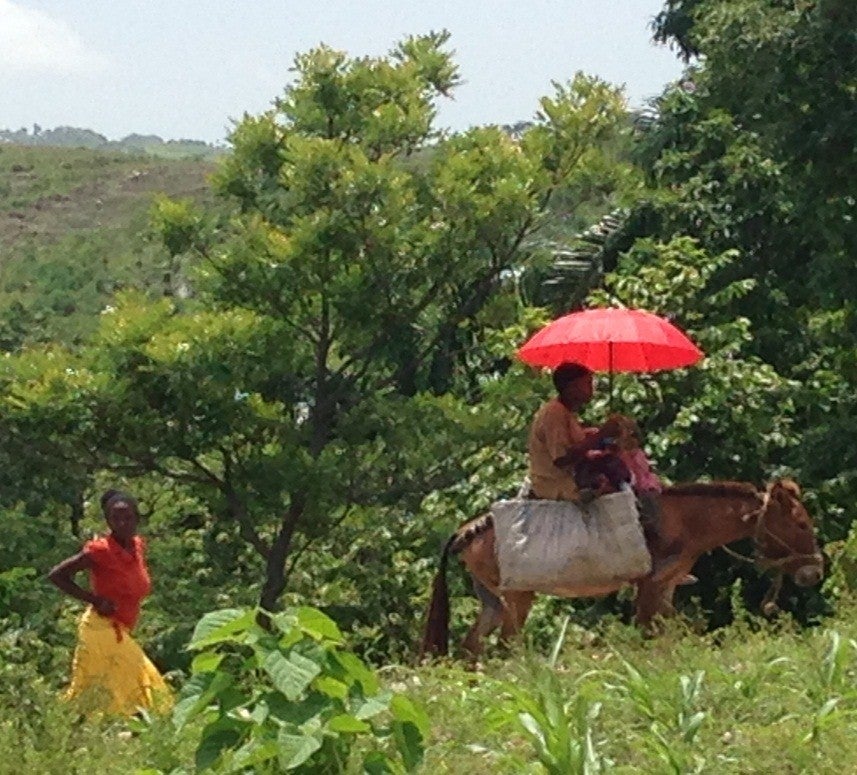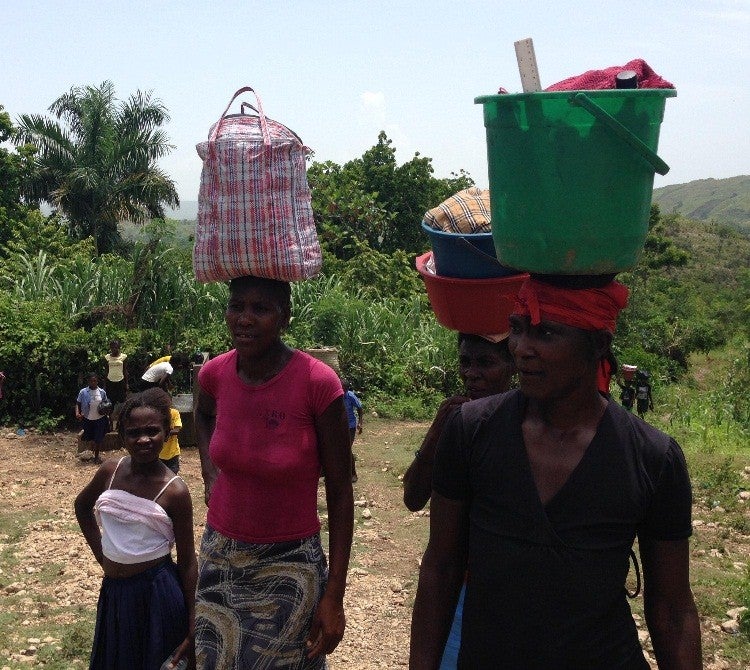
In the hills behind Boucan Carré, avocados are transported to the local market by donkey.
To be a Haitian farmer is not easy, yet agriculture remains the most important sector for growth and the largest source of jobs in Haiti. We know the challenges: deforestation, mountainous terrain, intermittent droughts, hurricanes and floods, right? But what I discovered while in the field with the teams supporting the IDA-financed Business Development Initiative within Haiti’s Ministry of Commerce, is that the natural gifts of this island are more profound than any of us realized.
Thanks to funding from the Competitive Industries and Innovation Program ( CIIP), teams of Haitians from each department have been able to travel and meet some exporters and wholesalers abroad to understand how best to add value to their products, market and sale them abroad.
The team from the South region already knew that Haitian vetiver essential oil was in high demand. But what the teams from the North, Southeast and Grand Anse regions heard from coffee companies in Seattle, Portland and San Francisco surprised them. "Your mountains are the hen of the golden eggs for coffee," said Jeff Babcock, Founder of Zoka Coffee in Seattle.
The feedback to the teams from Nippes and Northeast from the honey companies in Boston was even more positive. Finally, the logistical and wholesale companies in Holland told the teams from Artibonite and Centre that they could absorb as many mangoes and avocados as Haiti could produce. "We could get 40 trucks of mangoes per week from Haiti", said Shawn Harris, Founder Nature's Pride.
Haitian coffee is naturally of a high quality because of the temperatures and soil quality found at exactly the right altitudes. Haitian honey is rich in flavor because of the unique mix of flowers available to bees. angoes and avocados also represent great potential as demand has soared in the US and European markets.
Until now, Haitian producers have been unable to cash in on these advantages. Vetiver producers see a small fraction of the returns to perfume companies for its essential fragrance which is a key ingredient. Coffee beans are no longer produced in quantity, and most are not processed well enough to tap the “quality premium” which can sale as much as 2-3 dollars per pound - much more than the fair trade or organic premiums. Honey producers have been unaware of the potential of Haitian honey as a high quality export. And mango and avocado producers, in spite of their proximity and open access to the US market, have been losing an enormous percentage of their crop as it travels from farms to markets.

Women climb back up the hill after a portaging their peas to the local market.
The BDI is seeking to change this by putting teams of agronomists, economists, industrial engineers and marketers in departmental offices and training farmers and entrepreneurs along one value chain for each department during three years. The teams recently returned from study tours to better understand the end of their value chains and the expectations of the buyers in terms of quality. I sat in on the debriefing of their overseas travels, and heard their discussions about why farmers and entrepreneurs were not capitalizing on existing opportunities. But the challenge was made more real by a short visit with farmers in the central commune of Boucan Carré.
We met with an agent who was trying to help the famers establish a collection point in the hills, where there is no electricity and no passable roads, and he explained the challenge. “Last year we had a bumper crop of avocados. But it was more than what the farmers could ever hope to eat or sell in the local markets. So we tried to preserve the avocados by putting them in barrels with ice. But it didn’t work, and we lost almost all our crop.”
Some of the trees we saw are in deep ravines, and just extracting the avocados is a dicey prospect. These particular farms are also several kilometers into the hills and cannot be accessed after a heavy rain. Farmers or buyers lose some of the crop before even reaching the closest provincial town of Boucan Carré, or the larger market in Mirebalais, about an hour drive from Port-au-Prince. But the real challenge is to get access to refrigeration within a short window of time so that farmers and buyers can export the surplus to the nearest US market. Could the answer be solar cold storage? Or just faster and safer transportation to cold storage in town? Will it make sense economically? How much of any additional earnings will support the farmer?
These won’t be easy problems to solve. If it were, the famers would have found solutions. But the team from the Center Department is determined to find the right combination of more organized collection, investment in cold chain, better packaging for transport and better transport logistics. Their next steps are now to convince farmers that they can help, prioritize investments, connect the farmers to buyers and credit, identify gaps in their value chains, and generally keep making it happen. For these teams as they trace their way back along their value chains, they are now convinced that there is a market ready to embrace Haiti’s natural competitive advantages. After all, a Malian mango traveling to the Netherlands has to go twice as far as that Haitian mango to reach your local Whole Foods store.


Join the Conversation